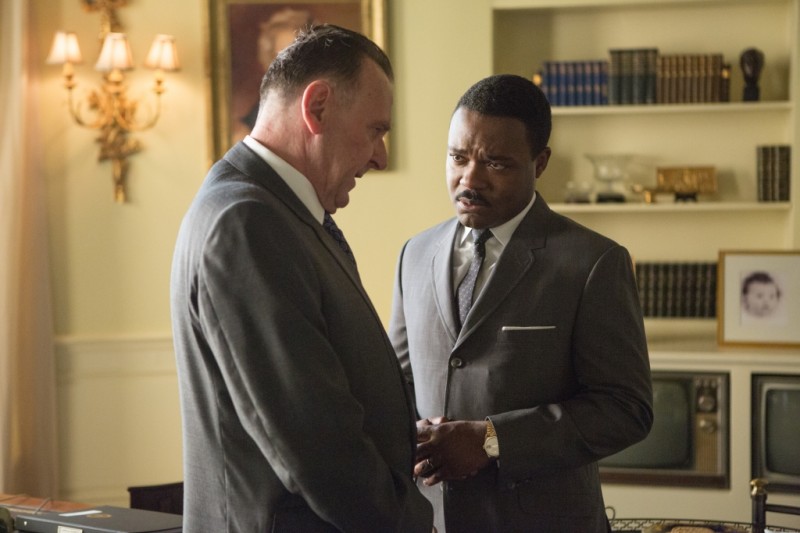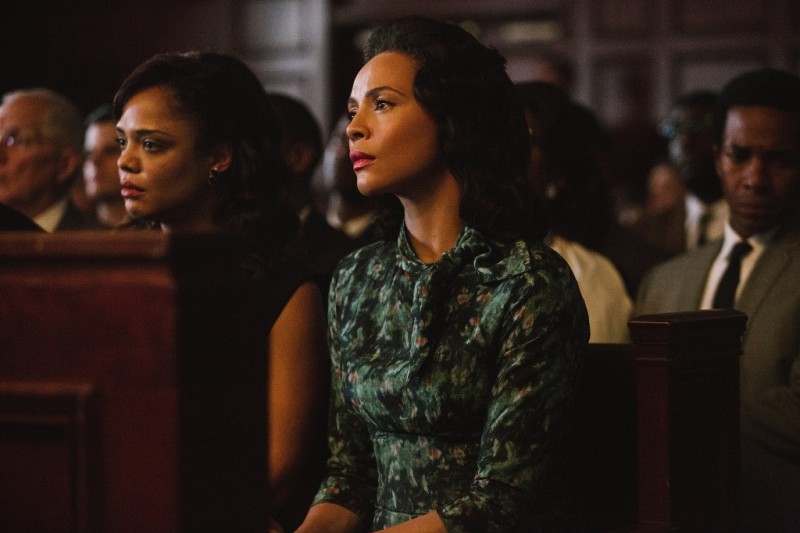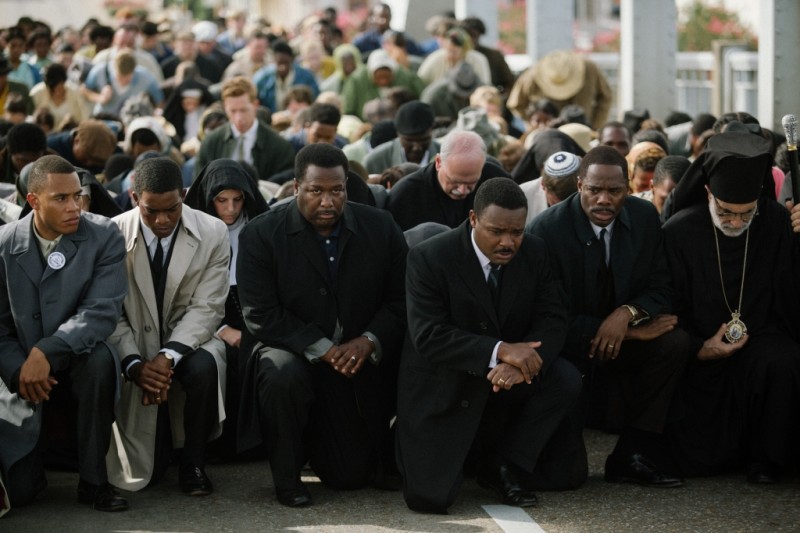Selma Review
"Depiction of a Dream Realized"
It's 2015 and Dr. King's dream has indeed been realized. For the most part. African-Americans in the United States now have the ability to vote and allow their voices to be heard; the power to decide the course of their future is now readily available. This once denied power was used to great effect and allowed President Barack Obama to be sworn into office as this nation's first black president. Sure, many African-Americans probably voted for him just because President Obama is a person of color. It did not matter what he promised to do for the country, what his background was, what his stance on abortion or same-sex marriage was. It mattered that the power was now available to choose him to lead the country; a power that would not have been made accessible were it not for the actions and sacrifices made by Dr. King and those who followed him to battle as depicted in this movie. And it was a battle, no doubt. A battle in a larger war that still rages on in this country nearly 50 years later.
Selma isn't an out and out biopic, which feels refreshing. So many films about important historical and cultural figures attempt to tackle the individuals entire life, which can fall apart if not handled with care. Instead of chronicling King's life and merely touching on his many triumphs and some of his setbacks, this film hones in on the intense period of the three marches from Selma to Montgomery in 1965.

The film opens with King accepting the Nobel Peace Prize and from there moves us into the thick of the film's primary conflict: securing fair and equal voting rights for Black Americans. The decision to start the film with King's acceptance of the Peace Prize is an inspired one. In a different film, this might have been where the story ended. However, I prefer how this film begins as it shows that Dr. King's work as a Civil Rights activist did not end after receiving the 1964 award, which put him on the world stage. It was the beginning of a new fight. Like Superman revealing himself to the world, King now has to carry the burden of being such a prominent and powerful figure. To whom much is given, much is tested, right? Well, Dr. King is certainly tested as you might imagine.
Obviously much is being said about David Oyelowo, who turns in a stellar performance as Dr. King nailing the cadence of speech and the general bearing possessed by the real-life figure. There could very well be nominations for him after this film. He makes the weight of his position feel palpable as he paints a layered and nuanced portrait of a flawed man constantly battling against outside forces as well as his own self-doubt in order to emerge not only as his best self, but also to secure a better future. Carmen Ejogo is also quite amazing as Coretta Scott King. Though she delivers in several powerful and understated moments, the skill and importance of her performance cannot be understated. She was perfect as King's other half. The film doesn't make short work about how important Coretta Scott King actually was. Sure, Dr. King was the public figure and took a lot of heat both figuratively and literally, which is in itself profoundly important, but Mrs. King was also significant as she provided a kind of stability and support to Dr. King that was crucial to his morale.

This film also contains a couple good cameo appearances as well as strong performances from other supporting members of the cast, which include the likes of Tom Wilkinson as President Johnson, Tim Roth as the despicable Governor George Wallace, Colman Domingo as Ralph Abernathy and André Holland as Andrew Young.
Films like this are always a challenge to watch without being viscerally effected by certain aspects. I'm not only speaking as a person of color, but also as a human in general. If director Ava DuVernay and her team have done their job right, and I think they have in this case, it should absolutely be a challenge to watch for any human. It should not be a comfortable experience in order for justice to be done to the events of Selma. The violence is captured with stunning accuracy when compared to any archival news footage in existence. It is not sugarcoated or cutaway from. Rather, the violence is laid bare in all its brutality and rawness. It almost feels documentary-style in its depiction. Spectators who thirsted for such actions are also acknowledged by the film, which manages to put the audience square in the middle of the horrifying and dangerous moments.

DuVernay has enjoyed marginal success with much smaller films like
I Will Follow and
Middle of Nowhere, which won her a Best Director Award at the 2012 Sundance Film Festival, but
Selma is the film that will no doubt bring her name to the forefront when it comes time to start talking award nominations for best director. She would be the first black woman to garner such a nomination. It would not be a stretch given that she handles the scope of such an epic tale with a sharp focus and manages to keep everything grounded. The larger than life aspects of Dr. King don't overshadow everything. Instead, we feel as if we are watching history being made in real-time.
It's amazing how timely
Selma is considering recent events. Mike Brown in Ferguson. Eric Garner in New York. Many others. This film is a good reminder of both how great change is possible even the face of seemingly insurmountable odds, but also that more change is necessary in order to further progress Dr. King's dream for a more harmonious existence. Don't misunderstand, today is a massive step forward from the place this country was in during the 1960s. A step I think Dr. King would have been proud to witness. That said, maybe in another 50 years, things will be even better than they are now.
Pros
- Expert pacing and handling of material by director DuVernay
- Oscar-caliber performances by David Oyelowo and others
Cons
- Nigel Thatch as Malcom X is my only gripe. His look was spot on, but his voice was too raspy for me.
 The film opens with King accepting the Nobel Peace Prize and from there moves us into the thick of the film's primary conflict: securing fair and equal voting rights for Black Americans. The decision to start the film with King's acceptance of the Peace Prize is an inspired one. In a different film, this might have been where the story ended. However, I prefer how this film begins as it shows that Dr. King's work as a Civil Rights activist did not end after receiving the 1964 award, which put him on the world stage. It was the beginning of a new fight. Like Superman revealing himself to the world, King now has to carry the burden of being such a prominent and powerful figure. To whom much is given, much is tested, right? Well, Dr. King is certainly tested as you might imagine.
Obviously much is being said about David Oyelowo, who turns in a stellar performance as Dr. King nailing the cadence of speech and the general bearing possessed by the real-life figure. There could very well be nominations for him after this film. He makes the weight of his position feel palpable as he paints a layered and nuanced portrait of a flawed man constantly battling against outside forces as well as his own self-doubt in order to emerge not only as his best self, but also to secure a better future. Carmen Ejogo is also quite amazing as Coretta Scott King. Though she delivers in several powerful and understated moments, the skill and importance of her performance cannot be understated. She was perfect as King's other half. The film doesn't make short work about how important Coretta Scott King actually was. Sure, Dr. King was the public figure and took a lot of heat both figuratively and literally, which is in itself profoundly important, but Mrs. King was also significant as she provided a kind of stability and support to Dr. King that was crucial to his morale.
The film opens with King accepting the Nobel Peace Prize and from there moves us into the thick of the film's primary conflict: securing fair and equal voting rights for Black Americans. The decision to start the film with King's acceptance of the Peace Prize is an inspired one. In a different film, this might have been where the story ended. However, I prefer how this film begins as it shows that Dr. King's work as a Civil Rights activist did not end after receiving the 1964 award, which put him on the world stage. It was the beginning of a new fight. Like Superman revealing himself to the world, King now has to carry the burden of being such a prominent and powerful figure. To whom much is given, much is tested, right? Well, Dr. King is certainly tested as you might imagine.
Obviously much is being said about David Oyelowo, who turns in a stellar performance as Dr. King nailing the cadence of speech and the general bearing possessed by the real-life figure. There could very well be nominations for him after this film. He makes the weight of his position feel palpable as he paints a layered and nuanced portrait of a flawed man constantly battling against outside forces as well as his own self-doubt in order to emerge not only as his best self, but also to secure a better future. Carmen Ejogo is also quite amazing as Coretta Scott King. Though she delivers in several powerful and understated moments, the skill and importance of her performance cannot be understated. She was perfect as King's other half. The film doesn't make short work about how important Coretta Scott King actually was. Sure, Dr. King was the public figure and took a lot of heat both figuratively and literally, which is in itself profoundly important, but Mrs. King was also significant as she provided a kind of stability and support to Dr. King that was crucial to his morale.
 This film also contains a couple good cameo appearances as well as strong performances from other supporting members of the cast, which include the likes of Tom Wilkinson as President Johnson, Tim Roth as the despicable Governor George Wallace, Colman Domingo as Ralph Abernathy and André Holland as Andrew Young.
Films like this are always a challenge to watch without being viscerally effected by certain aspects. I'm not only speaking as a person of color, but also as a human in general. If director Ava DuVernay and her team have done their job right, and I think they have in this case, it should absolutely be a challenge to watch for any human. It should not be a comfortable experience in order for justice to be done to the events of Selma. The violence is captured with stunning accuracy when compared to any archival news footage in existence. It is not sugarcoated or cutaway from. Rather, the violence is laid bare in all its brutality and rawness. It almost feels documentary-style in its depiction. Spectators who thirsted for such actions are also acknowledged by the film, which manages to put the audience square in the middle of the horrifying and dangerous moments.
This film also contains a couple good cameo appearances as well as strong performances from other supporting members of the cast, which include the likes of Tom Wilkinson as President Johnson, Tim Roth as the despicable Governor George Wallace, Colman Domingo as Ralph Abernathy and André Holland as Andrew Young.
Films like this are always a challenge to watch without being viscerally effected by certain aspects. I'm not only speaking as a person of color, but also as a human in general. If director Ava DuVernay and her team have done their job right, and I think they have in this case, it should absolutely be a challenge to watch for any human. It should not be a comfortable experience in order for justice to be done to the events of Selma. The violence is captured with stunning accuracy when compared to any archival news footage in existence. It is not sugarcoated or cutaway from. Rather, the violence is laid bare in all its brutality and rawness. It almost feels documentary-style in its depiction. Spectators who thirsted for such actions are also acknowledged by the film, which manages to put the audience square in the middle of the horrifying and dangerous moments.
 DuVernay has enjoyed marginal success with much smaller films like I Will Follow and Middle of Nowhere, which won her a Best Director Award at the 2012 Sundance Film Festival, but Selma is the film that will no doubt bring her name to the forefront when it comes time to start talking award nominations for best director. She would be the first black woman to garner such a nomination. It would not be a stretch given that she handles the scope of such an epic tale with a sharp focus and manages to keep everything grounded. The larger than life aspects of Dr. King don't overshadow everything. Instead, we feel as if we are watching history being made in real-time.
It's amazing how timely Selma is considering recent events. Mike Brown in Ferguson. Eric Garner in New York. Many others. This film is a good reminder of both how great change is possible even the face of seemingly insurmountable odds, but also that more change is necessary in order to further progress Dr. King's dream for a more harmonious existence. Don't misunderstand, today is a massive step forward from the place this country was in during the 1960s. A step I think Dr. King would have been proud to witness. That said, maybe in another 50 years, things will be even better than they are now.
DuVernay has enjoyed marginal success with much smaller films like I Will Follow and Middle of Nowhere, which won her a Best Director Award at the 2012 Sundance Film Festival, but Selma is the film that will no doubt bring her name to the forefront when it comes time to start talking award nominations for best director. She would be the first black woman to garner such a nomination. It would not be a stretch given that she handles the scope of such an epic tale with a sharp focus and manages to keep everything grounded. The larger than life aspects of Dr. King don't overshadow everything. Instead, we feel as if we are watching history being made in real-time.
It's amazing how timely Selma is considering recent events. Mike Brown in Ferguson. Eric Garner in New York. Many others. This film is a good reminder of both how great change is possible even the face of seemingly insurmountable odds, but also that more change is necessary in order to further progress Dr. King's dream for a more harmonious existence. Don't misunderstand, today is a massive step forward from the place this country was in during the 1960s. A step I think Dr. King would have been proud to witness. That said, maybe in another 50 years, things will be even better than they are now.